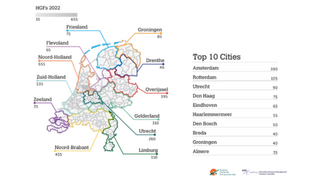The ScaleUp Dashboard is an annual survey of fast-growing companies, conducted by the Erasmus Centre for Entrepreneurship and RSM under the leadership of, Prof. Justin Jansen, professor of corporate entrepreneurship. A fast-growing company, or a scale-up, is one that employs at least 10 full time (FTE) employees and has an average growth of at least 20 per cent per year in the number of such employees and/or turnover over a three-year period.
Main results of the ScaleUp Dashboard 2020:
- Even before the Corona crisis, the increase in fast-growing companies in the Netherlands appears to have come to a halt. The strength of economic recovery after the Corona crisis has thus decreased significantly.
- The number of start-ups that continue to grow into fast-growing companies has again not increased during the past year after a similar stalling in last year’s report. Despite there being more start-ups in the Netherlands, this has not translated into more fast-growing companies.
- Almost two-thirds of fast-growing Dutch companies lose their rapid growth after the first growth spurt. This means that a great deal of potential for economic resilience is lost.
- The foundation of growth of a broader group of Dutch companies is highly sensitive to the economic cycle. This will make the impact of the Corona crisis more tangible.
- The momentum of rapid growth is currently coming from the energy transition, the emergence of new technologies and the increasing demand for healthcare. Fast-growing companies are thereby aligning themselves with broader trends and emerging customer needs, for example by offering sustainable energy solutions, new technologies or high-quality care.
- Amsterdam once again has the highest – and growing -– number of fast-growing companies, followed by Rotterdam and The Hague, both of which had fewer fast-growing companies within their municipal boundaries last year.
Dutch economy’s resilience was already greatly reduced
Despite the economic growth in recent years, the resilience of the Dutch economy appears to have already declined sharply before the Corona pandemic. “Fast-growing companies and successful start-ups are very important for the resilience and agility of the Dutch economy, especially in times of crisis. Due to their flexibility, adaptability and the creation of new jobs, they often ensure a faster and more successful recovery,” says Justin Jansen.
The climate for fast-growing companies appears to have deteriorated further in the past year. “No more fast-growing companies have joined, not even from young start-ups that are scaling up to scale-ups. Despite various support measures and programmes, we do not see a clear translation of this in the number of fast-growing companies. In fact, we have to ask ourselves whether all measures are effective in removing important obstacles and further stimulating ambitious growth entrepreneurs. I am starting to doubt that,” says Jansen.
Targeted growth policy necessary for specific challenges
The ScaleUp Dashboard shows that current growth policy in the Netherlands is unable to overcome a number of persistent obstacles. Measures are often too generic to bridge specific challenges. Action is necessary in two main areas:
Targeted and intensive support for ambitious start-ups and scale-ups, based on strict selection and taking into account important milestones
Many support programmes for start-ups and scaleups are of relatively short duration, and there are few for scaling up and maintaining rapid growth. This must change for a selected group of ambitious start-ups and scale-ups through targeted and high-quality development of leadership skills, and based on intensive and flexible support with clear milestones. If these are achieved, the support can be continued and intensified. If not, attention should shift to other potential fast growers.
Generic tools and smart techniques for a wider group of companies
An economy in transition requires imagination and the power to change, and so does the government. New technology can help with this, but so can smart tools and techniques widely used to enable entrepreneurs to provide an answer to the most important question about their future: how can I grow in an economy in transition? For example, gamification and the development of serious games can help them to understand which changes can be disruptive and why, and how companies can see new developments as an opportunity instead of a threat.
Note to the press
For further information, please contact Marleen Bax, Programme Manager for Erasmus Centre for Entrepreneurship on +31 10 302 1331, or by email: m.bax@ece.nl
Marianne Schouten, Communications Manager for RSM, on +31 10 408 2877, or by email at mschouten@rsm.nl.
The full report can be downloaded here. More information about the ScaleUp Dashboard can be found at: www.scaleupdashboard.com.




